Email marketing remains one of the most effective channels for connecting with customers. For WordPress website owners, adding the right mailing list plugin makes all the difference in campaign success. These tools help you collect subscriber information, manage lists, and send professional emails directly from your site.
In this guide, we’ll explore the top 5 mailing list plugins for WordPress that can transform your email marketing efforts. We’ll examine their key features, discuss pricing considerations, and provide recommendations based on different business needs. This will help you make an informed decision when choosing the right tool for your specific situation.
Why You Need a Quality Mailing List Plugin for WordPress
Email marketing remains a cornerstone of effective digital marketing strategies. When implemented correctly, it allows businesses to maintain direct communication with customers and prospects. A quality mailing list plugin bridges the gap between your WordPress website and email marketing efforts.
WordPress itself doesn’t include built-in email marketing features. Without a plugin, you’d need to manually export contact information and import it into a separate email marketing system. This creates unnecessary work and increases the chance of errors. Mailing list plugins eliminate this process by seamlessly connecting your website with your email marketing strategy.
The right plugin also helps with compliance requirements like GDPR. These rules mandate proper opt-in processes and easy unsubscribe options. Quality mailing list plugins handle these requirements automatically, reducing your legal risk while maintaining good sender reputation.
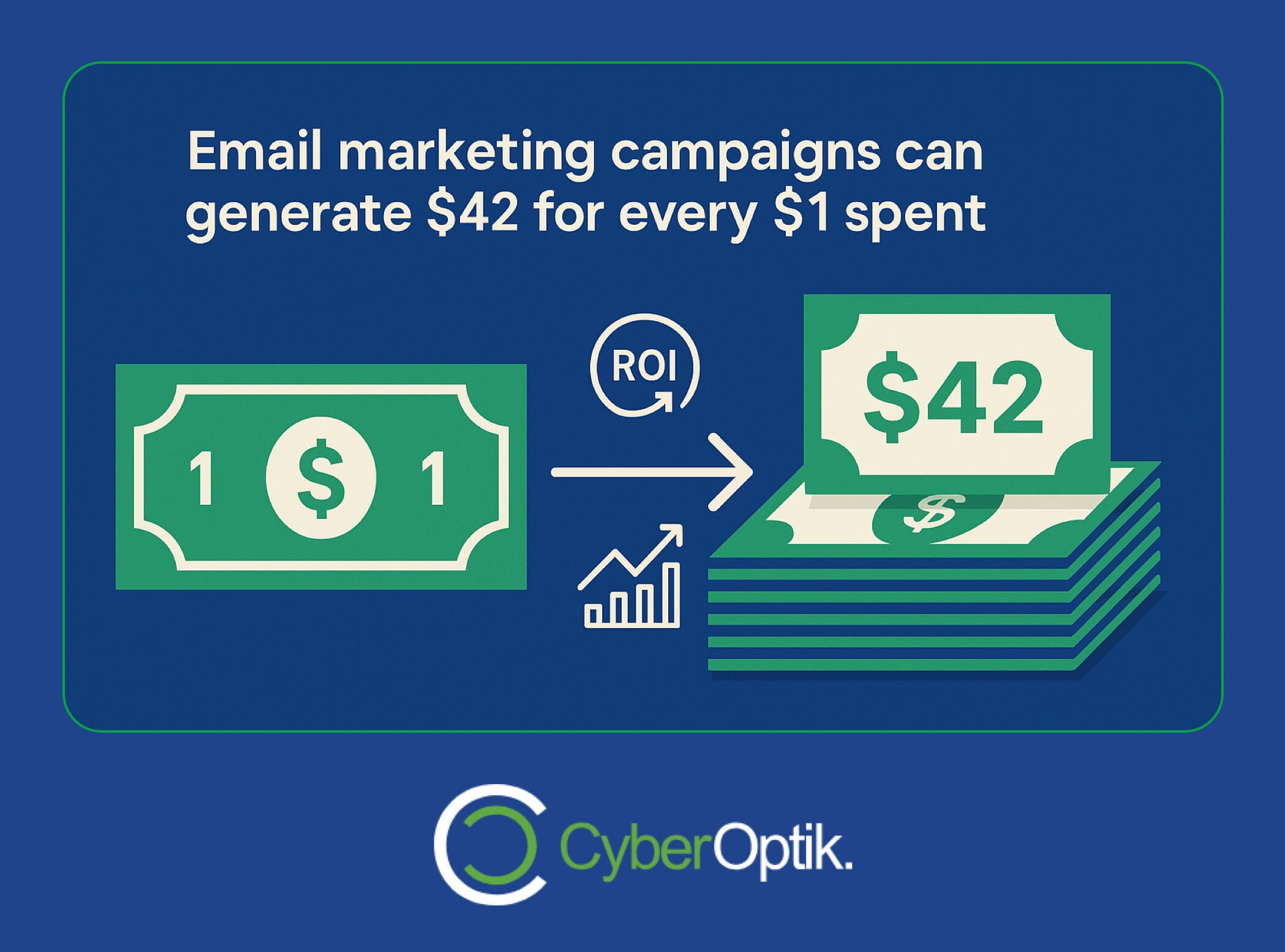
Email marketing delivers an excellent return on investment when properly executed. Email marketing campaigns can generate $42 for every $1 spent according to industry data. This powerful ROI makes investing in the right email tools a smart business decision.
Key Features to Look for in WordPress Mailing List Plugins
Before diving into specific plugin recommendations, let’s examine the essential features that make a WordPress mailing list plugin worth considering. Understanding these core capabilities will help you evaluate options based on your specific needs.
List Management Capabilities
Effective subscriber management forms the foundation of successful email marketing. Look for plugins that offer simple list creation and management tools. The best options allow you to organize subscribers into multiple lists or segments based on their interests, behaviors, or demographics.
Advanced plugins should support both manual and automated list management. This includes features like automatic list cleaning to remove invalid addresses and bounce handling to maintain good deliverability rates. These capabilities ensure your lists remain healthy and engaged.
Email Design and Templates
Your emails need to look professional across all devices and email clients. Quality plugins provide responsive email templates that automatically adjust to different screen sizes. This ensures your messages look great whether viewed on desktop computers, tablets, or smartphones.
The best plugins include drag-and-drop email builders that require no coding knowledge. These visual editors allow you to create professional-looking emails quickly. Look for plugins that offer customizable templates as starting points for your campaigns.
Automation and Workflow Tools
Email automation saves time and ensures consistent communication with your audience. Basic automation features include welcome emails for new subscribers and confirmation messages for form submissions. More advanced options offer complex automation sequences based on user behavior.
Workflow tools help you create sophisticated email sequences that respond to subscriber actions. For example, you might set up a series of educational emails that deliver different content based on which links a subscriber clicks. These capabilities allow for highly personalized communication without manual intervention.
Analytics and Reporting
Data-driven decision making requires access to thorough analytics. Quality mailing list plugins provide insights into open rates, click-through rates, and conversion tracking. This information helps you understand which campaigns resonate with your audience.
Look for plugins that offer visual reporting dashboards with easy-to-understand metrics. The ability to export data for deeper analysis in other tools also proves valuable for larger organizations. Effective analytics tools help you continuously improve your email marketing results.
Integration Capabilities
Your mailing list plugin should work seamlessly with your broader technology ecosystem. Native integration with WordPress ensures the plugin operates smoothly within your existing website. Additional integrations with CRM systems, e-commerce platforms, and marketing tools extend functionality further.
For WooCommerce users, specialized integration features help connect customer purchase data with email marketing efforts. This enables advanced capabilities like abandoned cart reminders and product recommendation emails based on purchase history.
Top 5 WordPress Mailing List Plugins
After examining dozens of options, we’ve identified the top mailing list plugins for WordPress websites. Each offers unique strengths and may be better suited to different business needs and technical requirements.
1. HubSpot
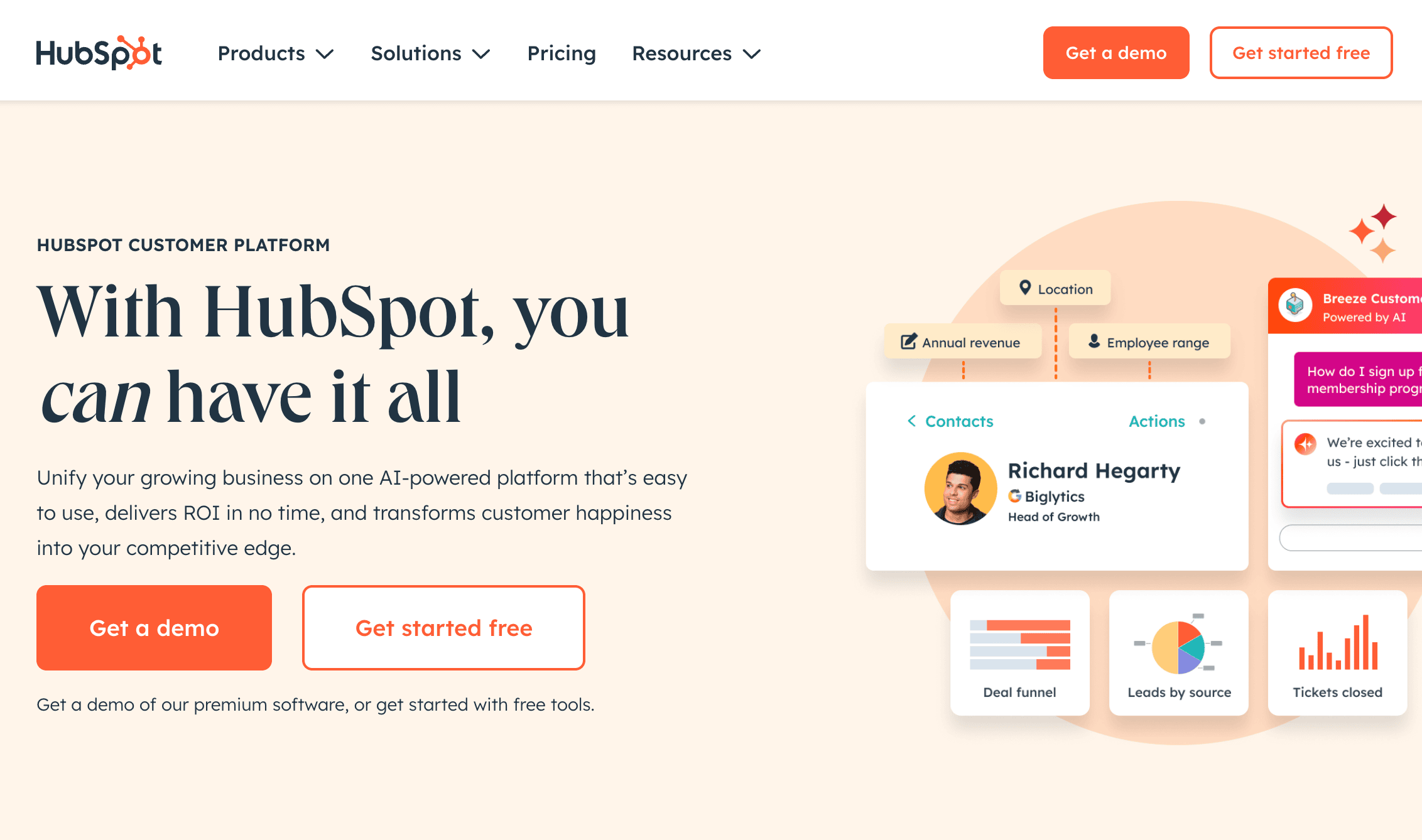
HubSpot stands out as a complete marketing solution that extends well beyond basic email capabilities. The plugin combines email marketing with CRM, live chat, forms, and analytics in a unified platform. Its drag-and-drop email builder makes creating professional campaigns simple, even for beginners.
The free version provides enough functionality for small businesses just getting started with email marketing. As your needs grow, you can upgrade to paid plans that unlock more advanced features. This scalable approach makes HubSpot suitable for businesses at various stages of growth.
The following table outlines key features of the HubSpot WordPress plugin:
| Feature | Availability | Benefit |
|---|---|---|
| CRM Integration | All Plans | Track customer interactions across channels |
| Drag-and-Drop Email Builder | All Plans | Create professional emails without coding |
| Form Builder | All Plans | Capture leads directly on your website |
| Live Chat | All Plans | Engage with visitors in real-time |
| Marketing Automation | Paid Plans | Create automated email sequences |
HubSpot works best for businesses looking for an all-in-one marketing solution rather than just email functionality. The complete approach helps maintain consistency across different marketing channels.
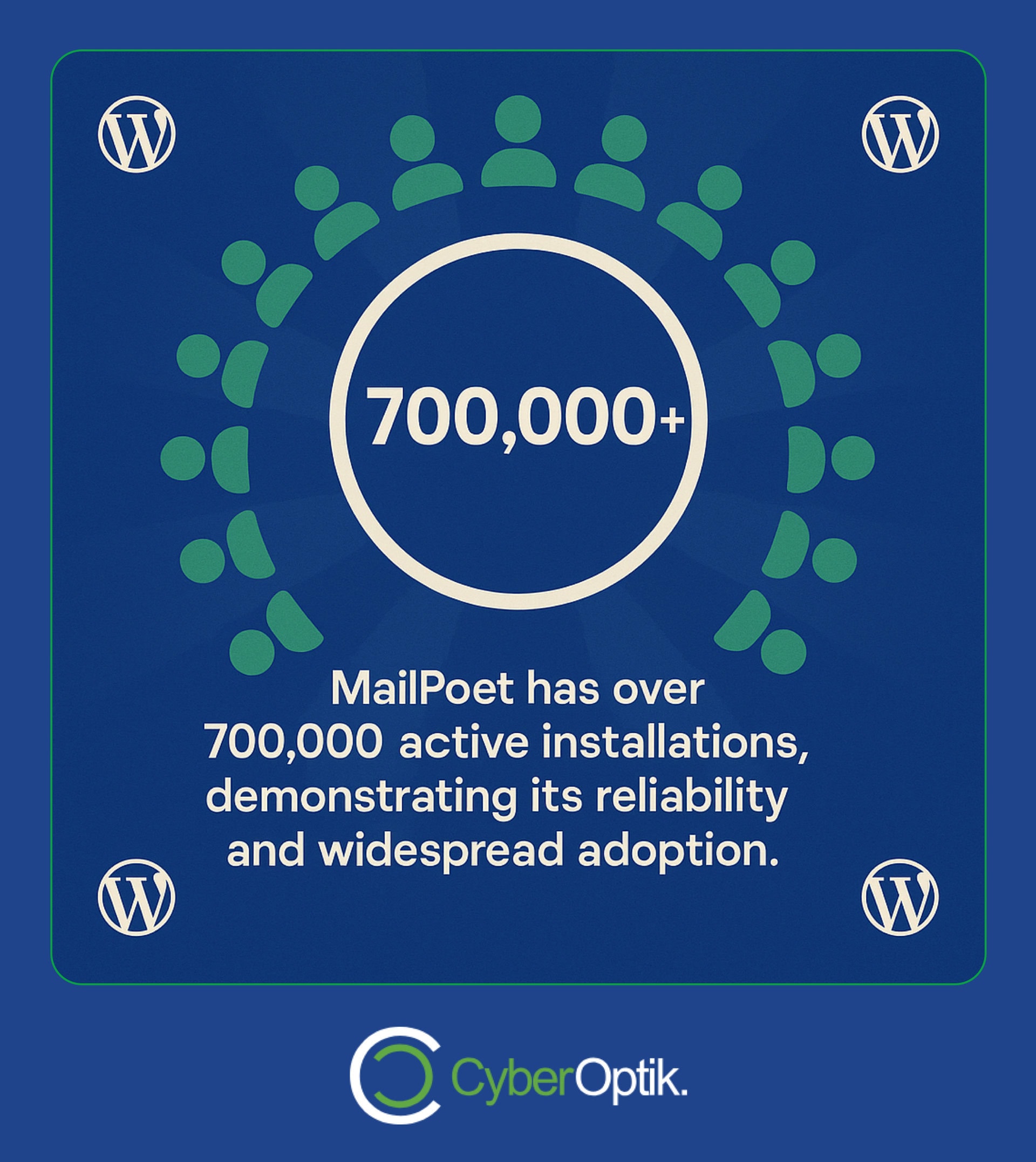
2. MailPoet
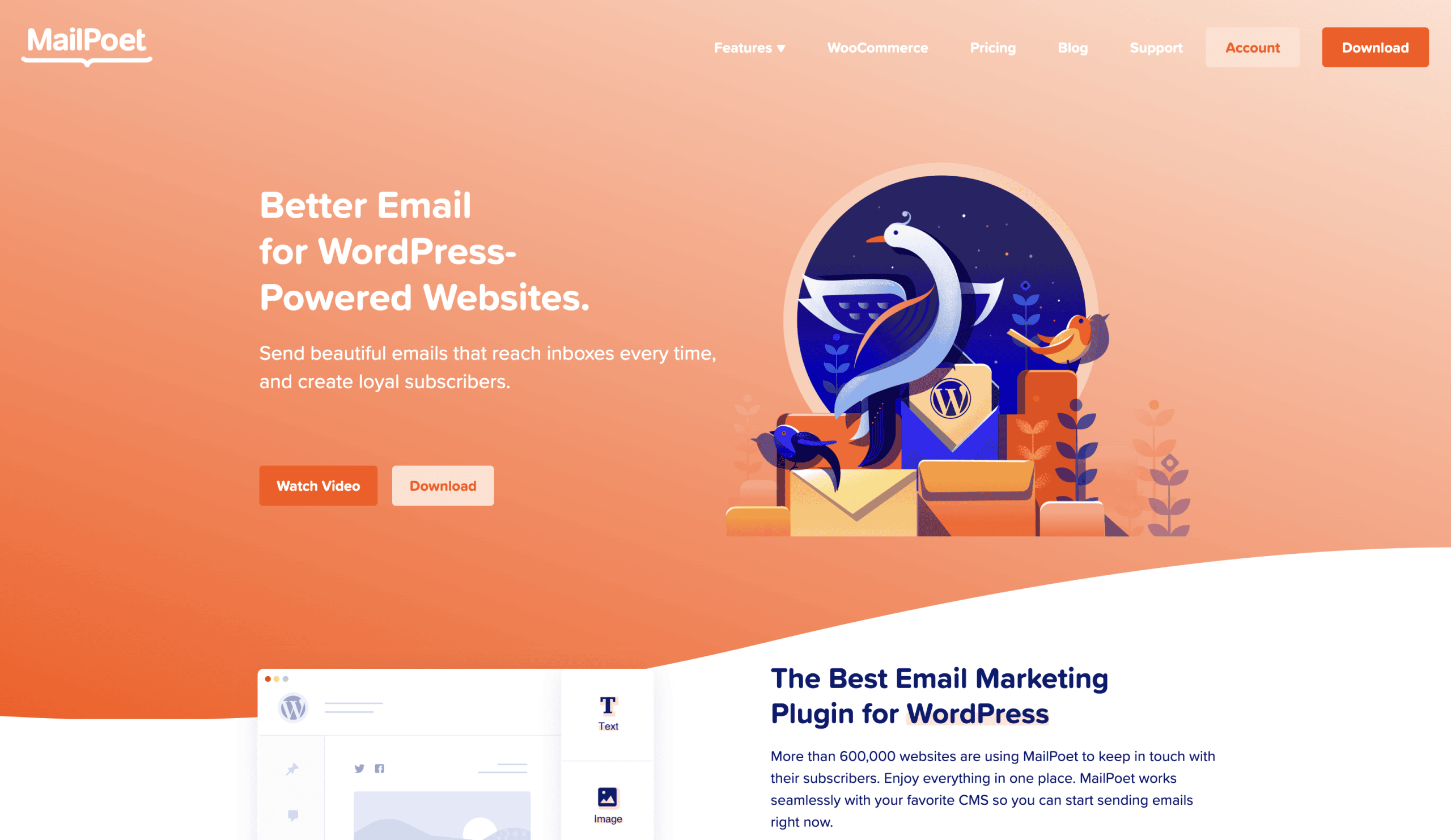
MailPoet offers a user-friendly approach to email marketing specifically designed for WordPress. This popular plugin has over 700,000 active installations, demonstrating its reliability and widespread adoption. It includes list management, email scheduling, and seamless WooCommerce integration for e-commerce sites.
One of MailPoet’s standout features is its simplicity. The plugin integrates directly into your WordPress dashboard, creating a familiar environment for managing email campaigns. This tight integration eliminates the need to switch between different platforms when creating and sending emails.
Here’s a breakdown of what MailPoet offers:
| Feature | Description | User Impact |
|---|---|---|
| WordPress-Native Experience | Fully integrated with WordPress admin | Familiar interface reduces learning curve |
| WooCommerce Integration | Special features for online stores | Targeted emails based on purchase behavior |
| Drag-and-Drop Editor | Visual email design tool | Create professional emails without HTML knowledge |
| Automated Emails | Welcome series, post notifications, etc. | Save time with pre-configured emails |
| Delivery Management | Built-in sending service or SMTP | Improved deliverability to subscriber inboxes |
MailPoet works exceptionally well for WordPress site owners who want a straightforward, native solution. Its free plan supports up to 1,000 subscribers, making it accessible for small businesses and startups.
3. ProfilePress
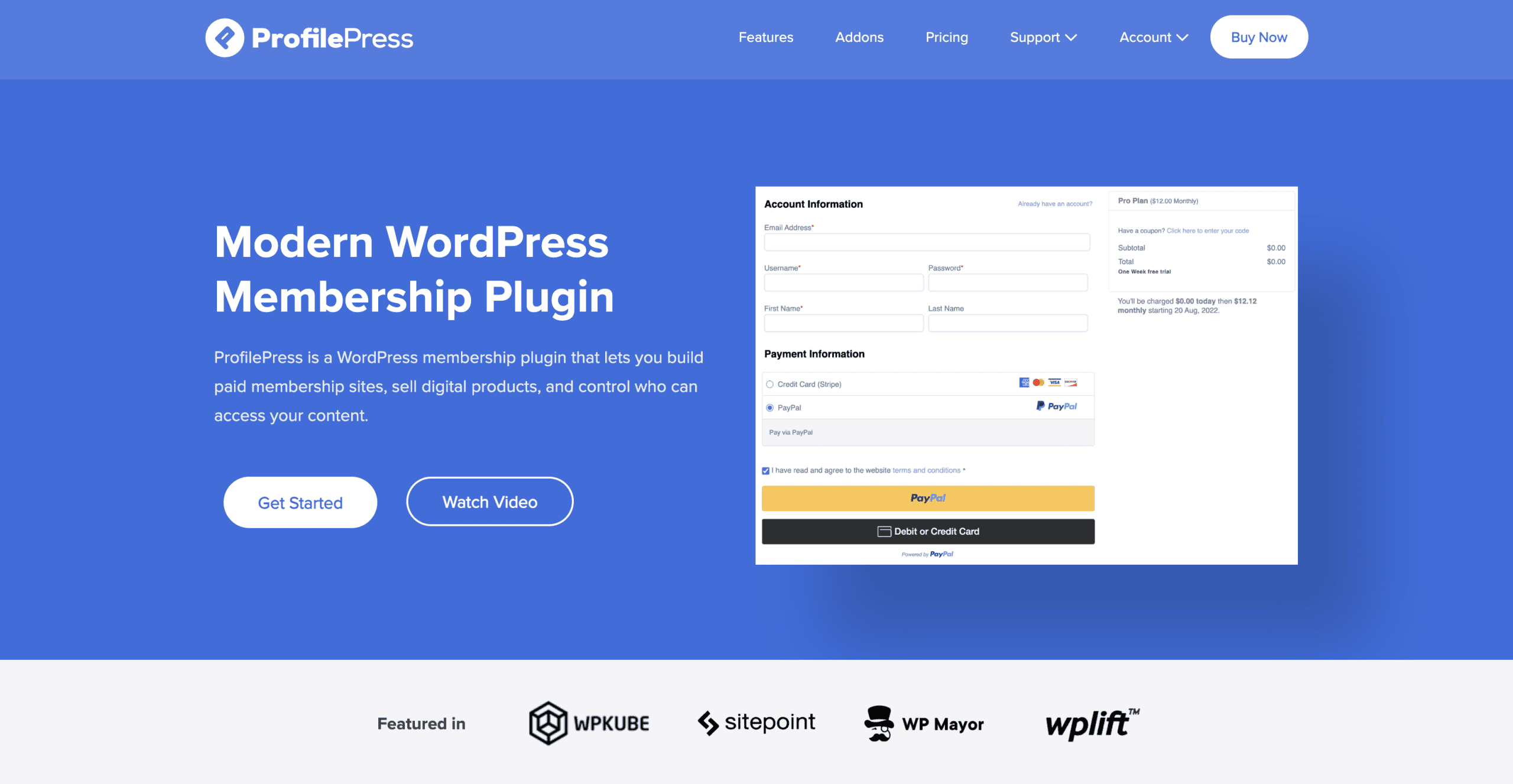
ProfilePress combines membership management with email marketing capabilities, making it an excellent choice for sites with subscription-based content. The plugin includes customizable forms for capturing subscriber information while maintaining a seamless user experience. These features appeal to content creators and membership sites that need integrated solutions.
While primarily known for its user profile and membership features, ProfilePress has expanded to include robust email marketing functionality. This dual focus makes it especially valuable for membership sites, online courses, and subscription-based businesses.
The table below highlights ProfilePress’s key capabilities:
| Feature Category | Available Functionality | Business Application |
|---|---|---|
| User Management | Custom registration, profiles, and login | Create membership sites with protected content |
| Email Marketing | List management and campaign tools | Communicate with members and subscribers |
| Form Builder | Customizable forms with various fields | Capture relevant subscriber information |
| Content Restriction | Control access based on subscription level | Create premium content areas for subscribers |
| Payment Integration | Process payments for memberships | Monetize subscriber-only content |
ProfilePress provides a unique combination of features that work particularly well for content-focused businesses. The integration between membership management and email marketing creates opportunities for highly targeted communication.
4. Newsletter Plugin for WordPress
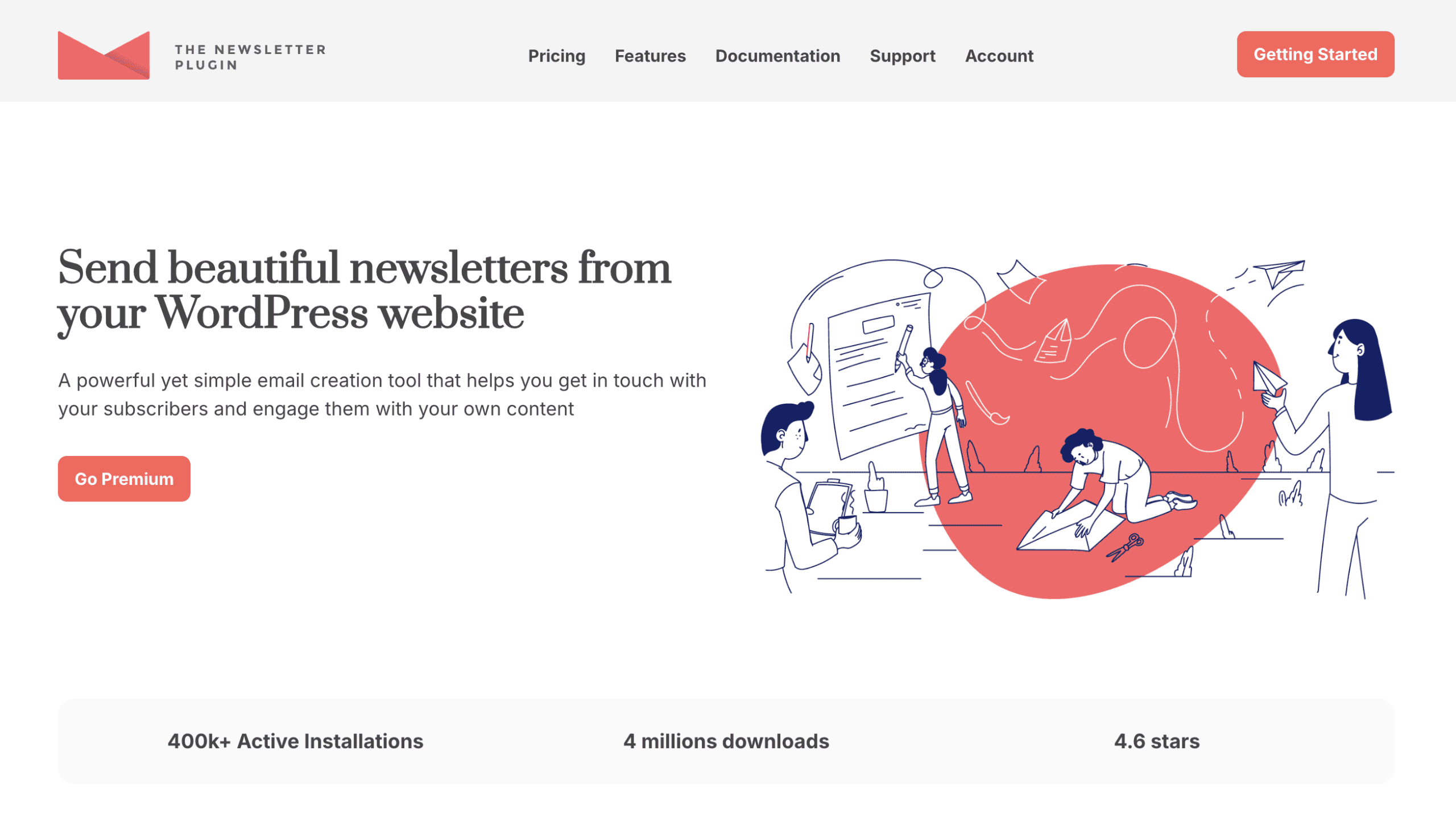
The Newsletter Plugin offers a balance of simplicity and power for WordPress site owners. This plugin focuses exclusively on email marketing without the additional features found in all-in-one solutions. This focused approach results in a lightweight plugin that won’t slow down your website.
With the Newsletter Plugin, you get essential email marketing capabilities without unnecessary complexity. It provides a clean interface for creating and sending both automated and broadcast emails to your subscribers.
Below is an overview of what the Newsletter Plugin offers:
| Core Functionality | Implementation Approach | Ideal Use Case |
|---|---|---|
| Subscription Management | Simple yet complete subscriber handling | Businesses prioritizing list growth |
| Email Composition | Basic editor with responsive templates | Quick campaign creation with minimal setup |
| Delivery Tracking | Essential statistics on email performance | Data-conscious marketers needing core metrics |
| Autoresponders | Sequential email series capabilities | Automated welcome sequences and courses |
| WordPress Integration | Seamless connection with posts and pages | Content publishers promoting blog content |
This plugin works well for businesses that need essential email marketing capabilities without advanced features they won’t use. Its lightweight nature makes it a good choice for performance-conscious WordPress sites.
5. Email Subscribers & Newsletters
Email Subscribers & Newsletters focuses on simplicity and ease of use. This plugin offers straightforward list building, broadcast emails, and automated notifications in a clean interface. Its approach makes email marketing accessible even to WordPress beginners.
The plugin excels at post notification emails, automatically alerting subscribers when you publish new content. This feature proves especially valuable for blogs and content-focused websites looking to drive return traffic.
Here’s what makes Email Subscribers & Newsletters worth considering:
| Feature Highlight | Capability Description | Business Benefit |
|---|---|---|
| Post Notifications | Automatic emails when content publishes | Keep subscribers engaged with fresh content |
| Subscription Forms | Multiple form types and placements | Maximize list growth opportunities |
| Email Templates | Pre-designed layouts for quick setup | Professional appearance with minimal effort |
| Scheduled Sending | Plan email delivery for optimal times | Reach subscribers when they're most responsive |
| List Management | Organize subscribers into groups | Send targeted content to specific audiences |
This plugin provides a good balance of functionality and simplicity. Its focus on core email marketing features without complex additions makes it appropriate for small to medium businesses prioritizing content distribution.
Comparison of Top WordPress Mailing List Plugins
To help you make the right choice, let’s compare these five plugins across important evaluation criteria. This comparison highlights each plugin’s relative strengths and ideal use cases.
| Plugin | Best For | Ease of Use | Free Plan | WooCommerce Integration |
|---|---|---|---|---|
| HubSpot | All-in-one marketing | Medium | Yes | Yes |
| MailPoet | WordPress-native experience | High | Yes (up to 1,000 subscribers) | Excellent |
| ProfilePress | Membership + email marketing | Medium | Limited | Basic |
| Newsletter Plugin | Focused email marketing | High | Yes | With add-ons |
| Email Subscribers | Content publishers | Very High | Yes | Limited |
This comparison shows that the “best” plugin depends entirely on your specific needs. Consider your business type, technical comfort level, and integration requirements when making your selection.
How to Choose the Right Mailing List Plugin for Your Business
Selecting the ideal mailing list plugin requires evaluation of your specific business needs. Start by considering the size of your email list and your growth projections. Plugins with tiered pricing based on subscriber count might become expensive as your list grows.
Next, assess your technical expertise and available resources. Some plugins offer more hand-holding for beginners, while others provide advanced capabilities that require more configuration. Choose a solution that matches your team’s skill level to ensure successful implementation.
Budget Considerations
Email marketing budgets vary widely across businesses. Fortunately, most WordPress mailing list plugins offer free plans or trials to get started. These free options often include limitations on subscriber numbers or feature availability.
For growing businesses, it’s important to understand how costs scale as your needs increase. Some plugins charge primarily based on subscriber count, while others focus on feature access. Calculate potential costs at various growth stages to avoid surprises later.
Technical Expertise Required
The technical complexity of mailing list plugins varies significantly. Some prioritize simplicity with straightforward interfaces and minimal setup requirements. Others offer deeper customization options that require more technical knowledge to implement effectively.
Be honest about your team’s capabilities when evaluating options. A powerful plugin with advanced features provides little value if you can’t effectively implement and use those capabilities. Sometimes a simpler solution that you can use well outperforms a complex one that isn’t fully utilized.
Scalability Needs
As your business grows, your email marketing needs will evolve. The right plugin should grow with you, adding capabilities as you need them. Business growth requires software that can handle increasing demands without major overhauls.
Look for plugins with modular designs that allow you to add functionality over time. This approach lets you start with essential features and expand as your strategy matures, without requiring a complete platform change later.
Integration Requirements
Your mailing list plugin needs to work harmoniously with your existing technology stack. Essential integrations include your WordPress theme, form plugins, e-commerce platform (if applicable), and any CRM systems you use.
Make a list of all systems that need to connect with your email marketing solution. Verify compatibility before committing to ensure smooth data flow between systems. Native integrations typically work better than third-party connections through services like Zapier.
Setting Up Your WordPress Mailing List Plugin: Best Practices
Once you’ve selected a plugin, proper setup lays the foundation for email marketing success. Start with a clear implementation plan that includes configuring essential settings, designing your subscription forms, and testing the entire system before launch.
Most plugins require similar initial configurations, including sender information, reply-to addresses, and basic branding elements. Take time to complete these setup steps thoroughly, as they affect how recipients perceive your messages.
Initial Configuration Tips
Begin by configuring your sender identity correctly. Use a recognizable business name and a legitimate reply-to email address that you monitor regularly. This establishes trust and gives subscribers a way to contact you with questions.
Next, set up your basic email templates with your brand colors, logo, and standard footer information. Creating these templates early saves time later when building individual campaigns. Include legally required elements like your physical address and unsubscribe links in all template footers.
List Building Strategies
Effective list building combines strategic form placement with compelling subscription incentives. Place signup forms at multiple points throughout your website, including your homepage, blog post footers, and about page.
Consider offering a valuable lead magnet to encourage signups. This could be an informative PDF guide, a helpful template, or access to exclusive content. The incentive should align with your audience’s interests while demonstrating your expertise.
To maintain list quality, implement double opt-in for new subscribers. This two-step process requires users to confirm their subscription via email after initially signing up. While this may reduce total signups slightly, it dramatically improves list quality by verifying email addresses and confirming genuine interest.
Compliance and Legal Considerations
Email marketing comes with important legal obligations that vary by region. The General Data Protection Regulation (GDPR) in Europe, the CAN-SPAM Act in the United States, and other regional laws establish requirements for collecting and using email addresses.
Common compliance elements include:
- Obtaining explicit consent before adding someone to your list
- Providing clear information about how you’ll use their data
- Including your physical address in all marketing emails
- Offering simple, one-click unsubscribe options
- Honoring unsubscribe requests promptly
Most quality WordPress mailing list plugins include features to help with these requirements. However, you remain responsible for ensuring your specific implementation complies with applicable laws in your region and the regions where your subscribers live.
Testing and Optimization
Before launching your first campaign, thoroughly test every aspect of your mailing list system. Send test emails to accounts at different email providers like Gmail, Outlook, and Yahoo to verify proper delivery and formatting.
Check that your subscription forms work correctly, confirmation emails deliver promptly, and unsubscribe functions operate as expected. This testing identifies issues before they affect your actual subscribers.
After launch, continually optimize your email marketing through A/B testing. Test different subject lines, sending times, content formats, and calls to action to determine what resonates best with your audience. Use these insights to refine your approach over time.
Common Issues and Troubleshooting
Even with careful setup, you may encounter challenges with your WordPress mailing list plugin. Understanding common issues and their solutions helps you resolve problems quickly when they arise.
Deliverability Problems
Email deliverability issues can severely impact your marketing effectiveness. If your messages aren’t reaching inboxes, even the best content provides no value. Several factors influence deliverability, including sender reputation, email content, and technical configuration.
To improve deliverability:
- Use a reputable sending service or SMTP provider
- Maintain a clean list by regularly removing inactive subscribers
- Avoid spam trigger words in subject lines and content
- Include plain text versions alongside HTML emails
- Set up proper authentication records (SPF, DKIM, DMARC)
Many deliverability issues stem from technical configuration problems. If you’re experiencing low delivery rates, verify your sending service settings and authentication records first.
Plugin Conflicts
WordPress sites often use multiple plugins that may sometimes conflict with each other. These conflicts can cause functionality problems with your mailing list plugin or even affect your entire site’s performance.
If you notice issues after installing a new plugin:
- Temporarily deactivate other plugins one by one to identify conflicts
- Check for JavaScript errors in your browser’s developer console
- Review your site’s error logs for specific error messages
- Contact the plugin developers for compatibility information
When possible, minimize the total number of plugins on your site to reduce conflict potential. Choose well-maintained plugins with regular updates and responsive support teams.
Performance Optimization
Email marketing plugins can sometimes impact your WordPress site’s performance, especially during list operations or campaign sending. This performance impact becomes more noticeable as your subscriber list grows.
To minimize performance issues:
- Schedule large campaigns during low-traffic periods
- Use a robust hosting solution with adequate resources
- Enable caching for your WordPress site
- Consider using WordPress caching plugins to improve overall site speed
- Regularly clean up your database to remove unnecessary data
For larger lists, consider plugins that process sending operations through external services rather than your WordPress server. This approach reduces the load on your website while improving email delivery reliability.
Maximizing Your Email Marketing Success
Selecting the right WordPress mailing list plugin represents just the first step in your email marketing journey. To achieve optimal results, focus on creating valuable content that addresses your subscribers’ needs and interests.
Engaging your subscribers with effective email marketing requires consistent delivery of relevant content. Segment your lists based on subscriber interests and behaviors to deliver more targeted messages. This personalized approach significantly improves engagement rates and conversions.
Don’t overlook the importance of email deliverability in your strategy. Even the best content provides no value if it never reaches the inbox. Maintain good sending practices and regularly monitor your delivery metrics to ensure your messages connect with subscribers.
Successful email marketing also requires continuous learning and adaptation. Regularly review your campaign analytics to understand what works for your specific audience. Use these insights to refine your approach over time, constantly improving your results.
Conclusion
Implementing the right mailing list plugin for your WordPress site can transform your email marketing effectiveness. Each of the plugins we’ve discussed offers unique strengths that may align better with different business needs and technical requirements.
HubSpot provides an all-in-one marketing solution that extends beyond email. MailPoet offers a WordPress-native experience with excellent WooCommerce integration. ProfilePress combines membership management with email marketing. Newsletter Plugin delivers focused email functionality without unnecessary complexity. Email Subscribers & Newsletters prioritizes simplicity for content publishers.
Consider your specific needs, technical capabilities, and budget when making your selection. The right choice depends entirely on your business goals and resources. Whichever plugin you choose, follow implementation best practices and focus on delivering valuable content to your subscribers.
Ready to enhance your email marketing efforts? Start by evaluating these top plugins against your specific requirements. Then implement your chosen solution following our setup guidelines. With the right tool and approach, your WordPress site can become a powerful email marketing platform that drives business growth.
How can you effectively capture leads with WordPress beyond just email list building? Expanding your lead generation strategy to include multiple touchpoints creates a more robust marketing ecosystem that supports business growth.
For website owners using WordPress plugins for the first time, remember that regular maintenance keeps your site secure and functioning properly. Stay current with updates and periodically review your plugin choices to ensure they continue meeting your needs as your business evolves.




